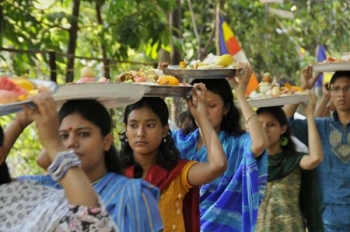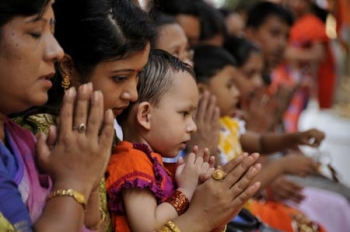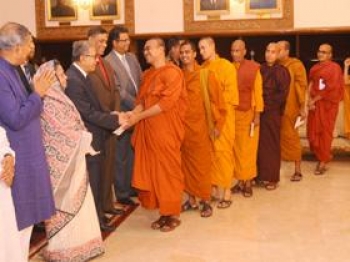When my elders retold to me Bangladesh’s struggle for independence, I was regaled with the fundamental principles that make an independent nation-state worth living in. One of these was religious pluralism, a value that we Buddhist minorities treasure above all else in a country with an Islamic majority.
As far as I have experienced, Bangladesh has fortunately remained committed to promoting religious harmony since 1971. One of the most inspiring sights is to see Bangladeshis uniting for religious and cultural festivals. The Buddha Purnima festival is one such event, celebrated with both delight and solemnity each year.
The Buddha Purnima, also known as Boishakhi Purnima, is also the biggest religious festival of the Buddhist community in Bangladesh. It is celebrated on the full moon day of the first month of the Bangla Calendar, Boishakh (which falls in May in the Gregorian calibration). This year, the full moon day is on May 13, 2014. The day marks three important events of the Blessed One’s life: his birth, enlightenment and death (mahaparinibbana).
On this full moon day, Buddhists around the country fly the national and Buddhist flags atop the temples, chant the discourses of the Tipitaka, hold sermons on the life of the Buddha, recite various scriptures, and practice group meditation. Many Buddhist organizations jointly organize colorful processions along the roads in Dhaka, Chittagong and other regional cities. Buddhist organizations also host various seminars and discussions.
Buddhists celebrate the day with their family, friends and relatives, and exchange greetings and solidarity. In the morning, devotees go to the temple to offer puja, flowers, incense, candles, and worship the Buddha. They reaffirm the Five Precepts and many of them further accept the Eight Precepts from monks. Special prayers are also given for the country’s peace and progress the world’s. Buddhists also engage in charity. They help the sick and elderly people by paying for medical expenditures, and distribute fruit and clothes to disadvantaged people.
To mark the day, many special articles are published in our daily newspapers, and there are serials, dramas, and talk shows on television and radio.
Religious diversity has shaped not only my self-understanding, but also the identity of the Buddha Purnima. I mentioned that it is a public holiday, one that Muslims and Christians (and all other religious adherents in Bangladesh) are welcome to join in. Participants go to Buddhist temples and join in processions and discussions marking the religious harmony between people of different faiths. Political leaders send special greetings and messages to the Buddhist community. The President of Bangladesh, Prime Minster, and opposition party leaders send separate messages to Buddhists as well as countrymen on the eve of Purnima. In 2013, the President of Bangladesh’s message reaffirmed His (Buddha's) efforts for creation of friendship among the people and love for creatures inspire all in building an ideal and knowledge-based society. The Prime Minister’s message said, Gautama Buddha used to foster equality, friendship, sacrifice, mercy and non-violence throughout his life. He preached the message of peace.
Following the civic tradition of religious tolerance, Bangladesh’s political heavyweights host a greeting exchange program in their offices. Many foreign ambassadors, diplomats, Buddhist leaders and people of Bangladesh are also invited.
The Buddha Purnima is a day everyone can draw spiritual nourishment from. It also encourages the Bangladeshi nation to preserve interfaith harmony. Because sometimes, we forget the sacrifices our elders made and vividly remember. Sometimes, we forget that there are tensions even today, and that violence and conflict endanger the dream of plurality. The Buddha’s message is a powerful reminder that there are plenty who still believe in that dream.
This year, Bangladesh’s Buddhists will be celebrating the Buddha Purnima with heartfelt enthusiasm and devotion.

















